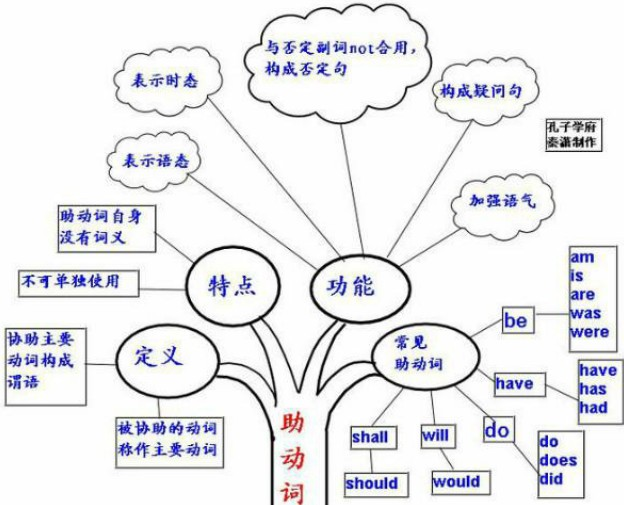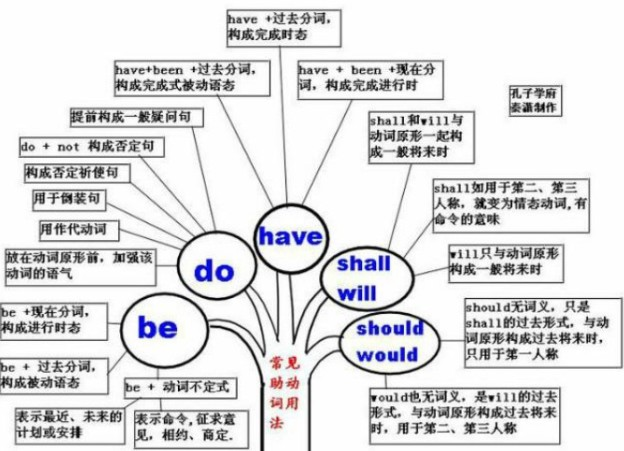本试题 “— Why not buy the beautiful necklace since you like it so much?— I would but I _____ have enough money.[ ]A. didn'tB. shouldn'tC. don'tD. hadn't” 主要考查您对助动词
一般现在时
等考点的理解。关于这些考点您可以点击下面的选项卡查看详细档案。
- 助动词
- 一般现在时
助动词的概念:
助动词是帮助主要动词构成各种时态,语态,语气以及否定或疑问结构的动词。助动词分为时态助动词和结构助动词两种。
助动词的用法:
1、助动词be的用法:
1)be+现在分词,构成进行时态。
例如:They are having a meeting. 他们正在开会。
English is becoming more and more important. 英语现在越来越重要。
2)be+过去分词,构成被动语态。
例如:The window was broken by Tom. 窗户是汤姆打碎的。
English is taught through out the world. 世界各地都教英语。
3)be+动词不定式,可表示下列内容:
a. 表示最近、未来的计划或安排。
例如:He is to go to NewYork next week. 他下周要去纽约。
We are to teach the freshmen. 我们要教新生。
说明:这种用法也可以说成是一种将来时态表达法。
b. 表示命令。
例如:You are to explain this. 对此你要做出解释。
He is to come to the office this afternoon. 要他今天下午来办公室。
c. 征求意见。
例如:How am I to answer him? 我该怎样答复他?
Who is to go there? 谁该去那儿呢?
d. 表示相约、商定。
例如:We are to meet at the schoolgate at seven tomorrow morning. 我们明天早晨7点在校门口集合。
2、助动词have的用法:
1)have+过去分词,构成完成时态。
例如:He has left for London. 他已去了伦敦。
By the end of last month, they had finished half of their work. 上月未为止,他们已经完成工作的一半。
2)have+been+现在分词,构成完成进行时。
例如:I have been studying English for ten years. 我一直在学英语,已达十年之久。
3)have+been+过去分词,构成完成式被动语态。
例如:English has been taught in China for many years. 中国教英语已经多年。
3、助动词do的用法:
1)构成一般疑问句。
例如:Do you want to pass the CET? 你想通过大学英语测试吗?
Did you study German? 你们学过德语吗?
2)do+not构成否定句。
例如:I do not want to be criticized. 我不想挨批评。
He doesn't like to study. 他不想学习。
In the past, many students did not know the importance of English. 过去,好多学生不知道英语的重要性。
3)构成否定祈使句。
例如:Don't go there. 不要去那里。
Don't be so absent-minded. 不要这么心不在焉。
说明:构成否定祈使句只用do,不用did和does。
4)放在动词原形前,加强该动词的语气。
例如:Do come to my birthday party. 一定来参加我的生日宴会。
I did go there. 我确实去那儿了。
I do miss you. 我确实想你。
5)用于倒装句。
例如:Never did I hear of such a thing. 我从未听说过这样的事情。
Only when we begin our college life do we realize the importance of English. 进了大学以后,我们才认识到英语的重要性。
说明:引导此类倒装句的副词有never, seldom, rarely, little, only, so, well等。
6)用作代动词。
例如:—Do you like Beijing? 你喜欢北京吗?
—Yes, I do. 是的,喜欢。(do用作代动词,代替like Beijing.)
He knows how to drive a car, doesn't he? 他知道如何开车,对吧?
4、助动词shall和will的用法:
shall和will作为助动词可以与动词原形一起构成一般将来时。
例如:I shall study harder at English. 我将更加努力地学习英语。
He will go to Shang hai. 他要去上海。
说明:在过去的语法中,语法学家说shall用于第一人称,will只用于第二、第三人称。现在,尤其是在口语中,will常用于第一人称,但shall只用于第一人称,如用于第二、第三人称,就失去助动词的意义,已变为情态动词。
试比较:He shall come. 他必须来。(shall有命令的意味。)
He will come. 他要来。(will只与动词原形构成一般将来时。)
5、助动词should,would的用法:
1)should无词义,只是shall的过去形式,与动词原形构成过去将来时,只用于第一人称。
例如:I telephoned him yesterday to ask what I should do next week. 我昨天给他打电话,问他我下周干什么。
比较:"What shall I do next week?" I asked. “我下周干什么?”我问道。
可以说,shall变成间接引语时,变成了should。
2)would也无词义,是will的过去形式,与动词原形构成过去将来时,用于第二、第三人称。
例如:He said he would come. 他说他要来。
比较:"I will go," he said. 他说:“我要去那儿。”变成间接引语,就成了He said he would come。原来的will变成would,go变成了come。
助动词知识体系:

常见的助动词用法解析:

一般现在时的概念:
表示通常性、规律性、习惯性的状态或者动作(有时间规律发生的事件)的一种时间状态。
一般现在时的用法:
1)经常性或习惯性的动作,常与表示频度的时间状语连用。常用的时间状语有every...,sometimes,at...,on Sunday等。
例如:I leave home for school at 7 every morning. 每天早上我七点离开家。
2)客观真理,客观存在,科学事实。
例如:The earth moves around the sun. 地球绕太阳转动。
Shang hai lies in the east of China. 上海位于中国东部。
3)表示格言或警句。
例如:Pride goes before a fall. 骄者必败。
注意:此用法如果出现在宾语从句中,即使主句是过去时,从句谓语也要用一般现在时。
例如:Columbus proved that the earth is round. 哥伦布证实了地球是圆的。
4)现在时刻的状态、能力、性格、个性。
例如:I don't want so much. 我不要那么多。
Ann writes good English but does not speak well. 安英语写得不错,讲的可不行。
比较:Now I put the sugar in the cup. 把糖放入杯子。
I am doing my homework now. 我正在做功课。
第一句用一般现在时,用于操作演示或指导说明的示范性动作,表示言行的瞬间动作。
第二句中的now是进行时的标志,表示正在进行的动作的客观状况,所以后句用一般现在时。
一般现在时知识体系:

一般现在时用法拓展:
1、一般现在时表将来:
1)下列动词come, go, arrive, leave, start, begin, return的一般现在时可以表示将来,主要用来表示在时间上已确定或安排好的事情。
例如:The train leaves at six tomorrow morning. 火车明天上午六点开。
—When does the bus star? 汽车什么时候开
—It stars in ten minutes. ?十分钟后。
2)以here, there 等开始的倒装句,表示动作正在进行。
例如:Here comes the bus.=The bus is coming. 车来了。
There goes the bell.=The bell is ringing. 铃响了。
3)在时间或条件句中。
例如:When Bill comes(不是will come), ask him to wait for me. 比尔来后,让他等我。
I'll write to you as soon as I arrive there. 我到了那里,就写信给你。
4)在动词hope, take care that, make sure that 等的宾语从句中。
例如:I hope they have a nice time next week. 我希望他们下星期玩得开心。
Make sure that the windows are closed before you leave the room. 离开房间前,务必把窗户关了。
2、一般现在时代替一般将来时:
When, while, before, fter, till, once, as soon as, so long as, by the time, if, in case(that), unless, even if, whether, the moment, the minute, the day, the year, immediately等引导的时间状语从句,条件句中,用一般现在时代替将来时。
例如:He is going to visit her aunt the day he arrives in Beijing. 他一到北京,就去看他姨妈。
3、一般现在时代替一般过去时:
1)"书上说","报纸上说"等。
例如:The news paper says that it's going to be cold tomorrow. 报纸上说明天会很冷的。
2)叙述往事,使其生动。
例如:Napoleon's army now advances and the great battle begins. 拿破仑的军队正在向前挺进,大战开始了
4、一般现在时代替现在完成时:
1)有些动词用一般现在时代替完成时,如hear, tell, learn, write, understand, forget, know, find, say, remember等。
例如:I hear(=haveheard)he will go to London. 我听说了他将去伦敦。
I forget(=have forgotten)how old he is. 我忘了他多大了。
2)用句型"It is…since…"代替"It has been…since…"。
例如:It is(=has been)five years since we last met. 从我们上次见面以来,五年过去了。
5、一般现在时代替现在进行时:
在Here comes…/There goes…等句型里,用一般现在时代替现在进行时。
例如:There goes the bell.铃响了。
时态一致:
1、如果从句所叙述的为真理或相对不变的事实,则用现在时。
例如:At that time, people did not know that the earth moves. 那时,人们不知道地球是动的。
He told me last week that he is eighteen.上星期他告诉我他十八岁了。
2、宾语从句中的,助动词ought, need, must, dare的时态是不变的。
例如:He thought that I need not tell you the truth. 他认为我不必告诉你真相。
与“— Why not buy the beautiful necklace since you like it so...”考查相似的试题有:
- Frank_________ London by train which _______ at 8:30 next morning.A.is leaving for ; will leaveB.is leaving for; le...
- His parents are very concerned about his son at school because he _______moving in his seat.A.is always keepingB.al...
- Mr. Smith couldn’t open the door because his naughty boy _______ it from the insideA.would lockB.was lockingC.has ...
- ----In fact, you _____ to write up the report within three days.----Sorry for not finishing it. I’ve been too busy re...
- --- How I wish I had studied harder when I was in senior school!--- If you had, you a university student now.A.areB...
- In the face of all these difficulties, we're not discouraged and keep ________ good spirits.
- Her smile suggested that she ___ satisfied with my answer.A.isB.wasC.beD.would be
- The fact that so many people still smoke in public places ______ we may need a nationwide campaign to raise awareness...
- Many scientists believe sea levels ______ by more than one meter by the end of the 21st century.A.will be risenB.wi...
- —Mike, do you know who wanted me on the phone?—Sorry. I don’t know. I ________ a bath in the bathroom.A.have hadB.w...